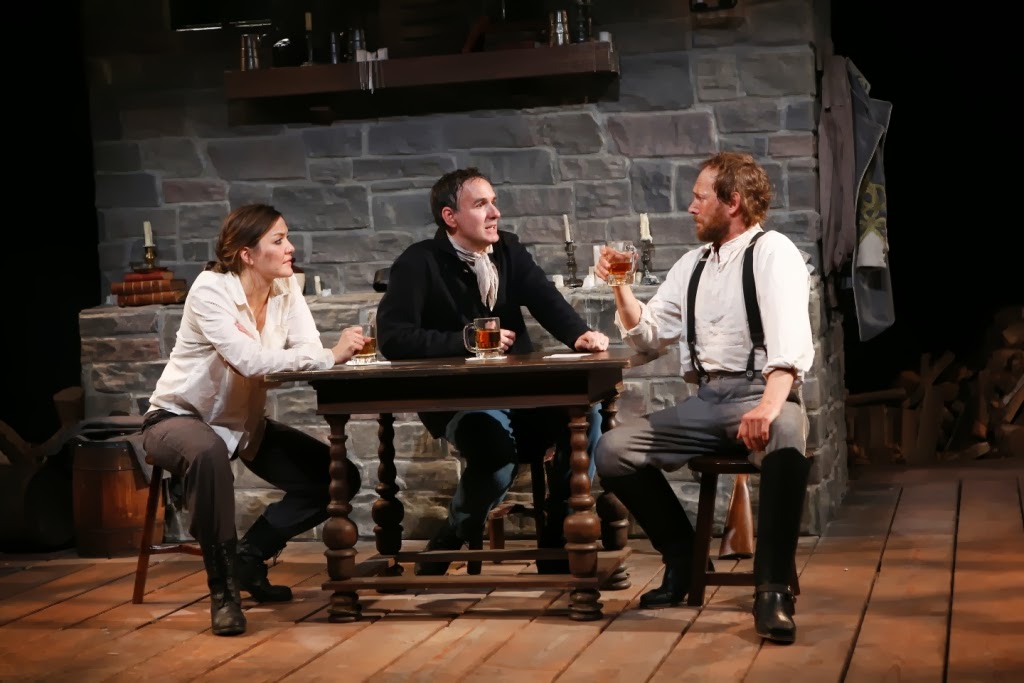Downstairs at New York’s City Center,
the Women’s Project Theater presents
a play about the United
States, human beings, divisions, and
Pickett’s Charge. Director Daniella Topol has guided her fine
actors in an engaging and engrossing play about us, then and now.
Jessica
Dickey's Row After Row is a treat, stimulating heart and mind,
beautifully acted and directed. The
clever scenic design by Clint Ramos
even provides a stimulating smell — wood, woodchips, and sawdust surround the warm
set of an old wood and stone pub.
Playwright Jessica
Dickey has lived in Gettysburg,
where history is not confined to the past.
Civil War re-enactors travel to each battlefield of the war and dress in
Confederate and Union army regalia and
weaponry as accurately as they can afford, and repeat battles. At Gettysburg,
the playwright participated herself in a re-enactment of Pickett’s Charge and
found a story to express. Thus Row
After Row.
If you do not recall, Pickett’s Charge was the disastrous
“hail Mary” play in the Battle of Gettysburg, in which Confederate soldiers
marched then ran a mile through an open, undulating field, defenseless, toward
their Union enemy. Not surprisingly, they were slaughtered by enemy cannon
fire, a furious hail of bullets, and finally, when a decimated group made it to
the Union line, bayonets and fists. Over
2000 soldiers died that day, and well over half of them were Confederates. Thousands more were wounded and
captured. It was devastating. It still is.
 |
| Rosie Benson as Leah, Erik Lochtefeld as Tom, and PJ Sosko as Cal. Photo Credit: Carol Rosegg |
In Row After Row, the scene
opens on three people — Lieutenant General James Longstreet watching the
charge, a Union deserter, and a woman in the garb of a Confederate soldier. Moments later, we see the woman sitting on a
stool in a stone-walled pub, and the two men enter exuberantly. They are re-enactors, the men having done
this for 20 years, the woman a new participant.
The action of the play shifts back and forth between these three
re-enactors in the present day and their counterparts during the real battle of
1863. Lighting Designer Tyler Micoleau creates these time
shifts subtly by a dimming, almost clouding of the lights when we revisit the
sooty battlefield — the heat of a July day, men, horses, guns, and cannon all
collaborating to kick up dust and smoke — then a slight bump to the soft but
brighter light within the modern-day pub.
The three actors are compelling in both eras. Rosie
Benton plays Leah in the present, a former modern dancer from New York, and a resident of Gettysburg in the past. Leah simmers with anger and pain, yet an
openness to new experiences and new people.
Benton
is sharp, precise, and soft all at once, quite marvelous. Erik
Lochtefeld is Tom in the present, a schoolteacher, a re-enactor who chooses
each year to play the Yankee deserter — an outsider who sues for peace in both
eras. Lochtelfeld’s skill and warmth
bring us into his heart in both time periods.
PJ Sosko is Cal, who takes
his re-enactments very seriously, and chooses to be General Longstreet. Leah’s description of him as a “bona fide
meathead” is probably the kindest epithet of the evening, yet he’s not all bad.
He and Tom have been friends since 6th grade, but in recent years Cal has seen less and
less of Tom and is almost as heartbroken as General Longstreet is upon watching
his men charge to their pointless deaths.
Sosko grabs us ungently and brings us along as he tries to grasp the
world around him.
 |
| Rosie Benson as the Woman in 1863. Photo Credit: Carol Rosegg. |
Cal and Leah provoke one another once Leah sits at Tom and Cal’s traditional
table. Cal immediately dubs her a “farb” — a person
who takes part in a re-enactment with less than authentic fabrics and costumes
and weaponry. A fight between the two
men and another that includes the woman are brilliantly choreographed by J. David Brimmer, who more than met the
challenge in the theatre’s close three-quarter staging.
 |
| The Woman, Sosko as General Longstreet, and Lochtefeld as Union deserter in 1863. Photo Credit: Carol Rosegg. |
Eventually we learn enough about these three people to hope
they find their way, make the best choices, to do their part in making their
lives, and our union, “more perfect.” Like
the Civil War, the past is not done with, and lives on in the present.
Cheers to all the cast and crew and creators of this fine
piece of drama that includes some hearty laughs leavening the serious subject
matter. It was a satisfying evening at
the theatre, but only runs to February 16th, so order tickets
here: http://wptheater.org/show/row-after-row/.
~ Molly Matera, off to
re-read some history that Jessica Dickey has clearly read already.





